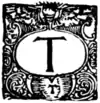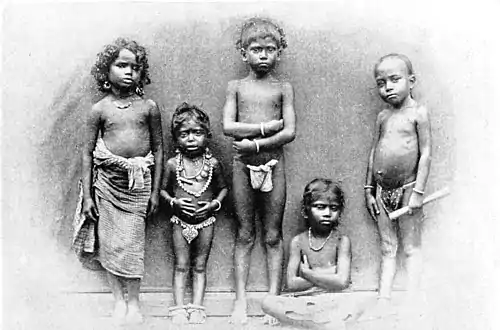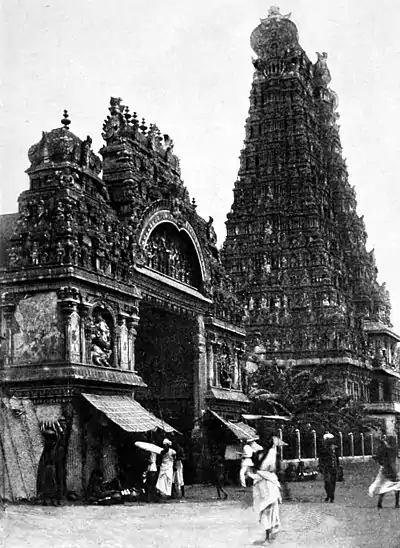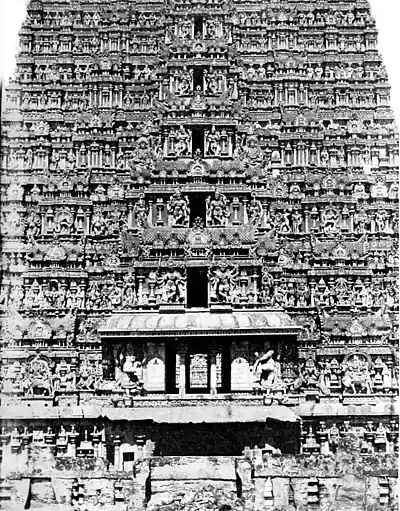WINTER INDIA
CHAPTER I
ON INDIA'S CORAL STRAND
 HE monkeys built a bridge for Rama to cross to Ceylon, and sections of the causeway by which Adam traversed the Palk Strait remain as evidence of his good fortune on tour; but for us there was the worst of many bad "B. I." boats, and a night of never to be forgotten misery, disgust, and discomfort on the Gulf of Manaar's deceptive waters. Of all dream nights in the tropics, none matched that night on which we coursed slowly along the south shore of Ceylon, from Colombo westward. Enormous stars pulsed in an intense indigo sky, the moon rose and, streaming across a summer sea, made a heaven above, beneath, and far around us. In the midst of this silvery world floated the odorous, untidy coasting steamer, from whose decks we instinctively lifted our skirts by day, and across which by dark sped myriads of enormous brown roaches. The dark boxes of cabins rustled with these fleeing insects when a light was brought, and we retreated to spend the night in deck chairs.
HE monkeys built a bridge for Rama to cross to Ceylon, and sections of the causeway by which Adam traversed the Palk Strait remain as evidence of his good fortune on tour; but for us there was the worst of many bad "B. I." boats, and a night of never to be forgotten misery, disgust, and discomfort on the Gulf of Manaar's deceptive waters. Of all dream nights in the tropics, none matched that night on which we coursed slowly along the south shore of Ceylon, from Colombo westward. Enormous stars pulsed in an intense indigo sky, the moon rose and, streaming across a summer sea, made a heaven above, beneath, and far around us. In the midst of this silvery world floated the odorous, untidy coasting steamer, from whose decks we instinctively lifted our skirts by day, and across which by dark sped myriads of enormous brown roaches. The dark boxes of cabins rustled with these fleeing insects when a light was brought, and we retreated to spend the night in deck chairs.
Some cross current in that pent-up pocket of Manaar makes it a rival of the English Channel for nausea; but at daylight the ship anchored in shallow, gray-green waters seven miles off the low-lying coast of the Indian peninsula—"India's coral strand"—and for two hours it rocked there more fully to complete the misery of two hundred coolie passengers, heaped together on the forward deck like so much cargo. It was slow work disembarking these limp folk, who fell prone in every stage and attitude of misery fore and aft on the reeling tender. A greasy bench was reserved for us amidships, fairly touching the boilers, and, after inhaling steam and engine grease for an hour, we reached the snow-white beach. Inky-black cargo coolies in red and white draperies filed up and down the sandy shore and the narrow pier of Tuticorin, and there was local color to spare; color, too, in the Custom-house, where an aldermanic black official, with an exaggerated sausage of a turban linked around his caste-marked brow, received us with unctuous gravity, listened to our declaration that we had neither spirits, ammunition, nor firearms, and let us go with our unopened luggage, free to wander at will from that furthest end of the empire to the uttermost mountain wall, without official interference or question, welcome without passport or permit, free from espionage and annoyance: a liberty of entrance, a courteously opened door, that covers the American tourist with chagrin as he contrasts it with the landing at any of his own ports.
Tuticorin's white walls and houses, white sand 
TAMIL CHILDREN
The Tamil people, ebony black, inky black, sooty black, tall and spare to emaciation, lilted past us on the thin, spindle legs of storks. A mountain of red peppers was heaped in one white square, and scores of the blackest Tamil women, in pepper-red draperies and much silver jewelry, slowly walked and worked around its edges. It was too theatrical, too barefacedly a color tableau set to catch the tourist eye, and I was convinced that it lasted only for that half-hour. The primitive hotel facing the railway station was but a loge looking upon the white roadway of a stage, where a specially engaged troupe of tall Tamils and noble white sacred bullocks paraded for our delight. When the train came in there was bedlam drama at the station's street door; then all the black troupe made exit and melted away to distance and shade; there was an interval, an entr'acte, and we went over and behind the scenes for a while.
The station-master was black, the telegraph operator was shades blacker, and an uncut emerald, swinging from the upper rim of one ear, held me with a great fascination while he skimmed the handful of despatches. First and last, and all of the time, in Indian travel, one telegraphs, and then sends more telegrams ahead, to any and every person connected with his future movements. One telegraphs to dak banglas, to station rooms and hotels, that he is coming; to station-masters that he shall want sleeping accommodation on certain trains; to local guides to secure their services; to high priests, magistrates, commissioners, and commandants that he wishes to see certain temples or sacred treasuries of jewels; and—the government telegraphs being moderate in price—one may "wire" away as recklessly as an American railway president for a comparative trifle.
The Tuticorin station walls were hung with notices and framed regulations, and there was posted a formidable black list of fines and punishments judicially awarded; the offender and his offense paraded to all who travel. Pattu This and Moolie That were fined "for letting their cattle stray and be killed on the track"; another had been caught "riding on the trucks without a ticket"—presumably some passengers, having tickets, do ride on the trucks. They run the Indian railways for the good of the stock-holders evidently, and receivers of unhappy railways in America might learn lessons of economy in this land of want, for this is only a periodical advertisement which I cut from a Calcutta paper:
EAST INDIAN RAILWAY
Tenders for the right of picking cinders from ashpits and pumping engines during the twelve months ending 31st March
Tenders will be received at the office of the Controller of Stores, East Indian Railway, Calcutta, up to noon of Thursday, the 14th February , for the right of picking cinders from ashes removed from ashpits and pumping engines throughout the line during the twelve months from 1st April to 31st March .
Form of tender, embodying full particulars, can be had on payment of Re. 1 to the Company's Chief Paymaster, Calcutta, or to the Storekeepers at Asansol, Jamalpur, Dinajpur, Allahabad and Cawnpore, to whom applications, with remittance, should be addressed. Applicants are also referred to the hand-bills posted at railway stations.
All other payments, including a deposit of Rs. 100 as earnest money, will have to be made direct to the Company's Chief Paymaster in Calcutta, whose receipt alone will be recognized, and no payment in respect thereof will be received in the Store Department. Hoondees and stamps will not be accepted.
The Company will not be bound to accept the highest, or any, tender, and reserves the right to accept any tender in part only.
By order,
J. OATES,
Controller of Stores.
Calcutta.
We had heard much of the luxury of Indian railway travel, of the roomy compartment and dressing-room that came to the holder of a first-class ticket without extra charge. We found that the roomy compartment was destined for four people, and contained two long leather-covered seats, or couches, along the side of the ear, with two hanging berths that could be dropped at night. The seats had no springs and no backs, unless one chose to lean against the single, rattling window-pane, that lifted by a strap like a carriage window. The cast-iron fittings in the dressing-room were ruder and more primitive than those of any American emigrant car, and when the train began its deliberate progress, we found that the body of the car swung so low, so nearly rested on the trucks, that we were jolted and shaken and deafened, as if in a coal-car, and covered with the dust of the road-bed. Nothing different or better was found, save once, in any part of India, When night came, a feeble oil-lamp was introduced through the roof, that made it possible to distinguish outlines and large objects, but not to read.
The train jogged along northward through a flat, cultivated country, with aloe and thorn hedges inclosing the tracks. After the rank greenness of Ceylon, these dusty fields of the dry season seemed poor and sterile. The train halted near mud villages, and the station platforms were covered with lean and leisurely black folks in red and white cotton draperies, standing at ease, their foreheads so dotted and striped with red, white, and ocher caste-marks, those ciphers, crests, and hall-marks of their creed, that they looked like so many painted red Indians of our West on the war-path. There was the usual station bedlam when the train drew up in darkness at Madura, and we followed a Tamil leader out to blacker darkness across the tracks to the dak bangla. The coolie who carried the bearer's tin trunk on his head stumbled over tree roots and finally struck a branch overhead. There was a crash, a bang, and a wreck of Tamil property, and then a flood of Tamil language, as David, our venerable traveling servant, poured out his wrath on the whining offender, who had been bruised and dented a little himself.
The dak bangla was Spartan in its simplicity, the government providing only beds, chairs, tables, and bath-tubs, the stern necessities of comfort in a hot climate. The stillness was as intense as the darkness all night, and after the chota hazri (little breakfast) of the Indian dawn we drove three miles across awakening Madura—a city of low, white houses, with green cocoa-palms and broad banana leaves the only strong color notes. The white houses were dusted and clouded with the red earth surrounding them, all dilapidated and in need of repair, of fall cleaning and whitewash. All Madura was awakening at that dewy hour,—tousled folks who came to the doors, yawned like alligators, stretched their leans arms in air, and scratched their heads vigorously. Men lounged face down on charpoys, or string-beds, or lolled on the high shelves built in the alcoves beside the house doors, and chatted with neighbors who had also spent the night in the open; babies sprawled on the warm red earth, and pious women traced religious symbols in white chalk on the red thresholds. Every door had its sect-mark, its religious symbol and monogram, as much as the foreheads of the people. Every blank wall, too, was plastered over with flat manure cakes, the common and universal fuel of the country, which one sees in process of manufacture and use from end to end of the empire; a fuel whose rank smoke can be detected in everything one eats and drinks in India, from the earliest tea and toast of the morning to the final rice pudding and coffee at night; a fuel whose use deprives the fields of their natural enrichment and adds to the general poverty; a fuel whose manufacture—the gathering, kneading, and shaping into flat cakes to be slapped against a wall to dry—is such ignoble work that rarely any but women are employed in the unending task.
After these early morning sights in the streets, the fantastic Teppa Kulam was a bit of fairyland, a great tank inclosed in a striped red and white stone parapet, with a dazzling marble platform in its center upholding the most fanciful little white coroneted temple, the glorified pavilion of a confectioner's dreams, four mites of lesser pavilions reflected from each corner of the platform. We drove down shady lanes, past the elephant stables, to the garden of the English judge to see the great banian tree, whose main trunk, over seventy feet in circumference, is surrounded by a hundred lesser trunks and newly rooted filaments—a leafy hall of columns, measuring one hundred and eighty feet across.
We went to the spacious Moorish and Hindu seventeenth-century palace of the great ruler, Tirumala Nayak, and after a small boy of the neighborhood had taken us in charge and scolded, stamped his foot, and pushed an old gray-haired sweeper about, that abject being produced the keys and admitted us to cool, shadowy halls and council-chambers with richly carved and paneled ceilings, to the king's bedchamber, where a carved and gilded bed once swung by chains from latticed ceilings, and down whose chains the clever thief slid to steal the crown jewels; and from the terraced roof where the prime minister used to dwell we saw the whole, 
THE GREAT GOPURA MADURA TEMPLE
These gopuras loom and dwindle away toward the sky in such a way as to make all things seem toys, and the people pygmies. One such monument would be architectural fame for any city, but Madura's rich shrine is protected by nine such soaring, pyramidal sky-scrapers, the four in the outer wall nine stories in height. These most ornamental of defensive constructions begin with door-posts of single stones, sixty feet in height, and rise, course upon course, carved with rows of gods and goddesses, peacocks, Hulls, elephants, horses, lions, and a bewildering entanglement of symbolical ornament all colored and gilded, diminishing with distance until the stone trisul at the top, two hundred and fifty feet in air, looks like the finest jeweler's work. This great shrine of Shiva and his fish-eyed consort is a labyrinth where one easily wanders a whole morning. The anteroom or vestibule of the temple is a long hall or choltry, an open pavilion divided by four rows of most elaborately carved columns, where the king used to receive the annual visits of Shiva—a miserable little black image. Neither kings nor idols occupied it then, but a legion of shopkeepers were gathered there, who vaunted their goods and pushed their wares upon us with fury and zeal—cloth, cotton, lace, brass, glass, perfumes, incense, and fruits. One spectacled merchant was casting up his accounts in a ledger made of strips of talipot palm leaves, an orthodox fashion as old as writing. Others pressed upon us pieces of filmy, gold-bordered Madras muslins, eight yards of which are required for a turban or a woman's sari. There were none of the ancient India muslins, those "floating mists," or "webs of the air," of which one has heard but never sees in this day of Manchester piece goods, steam-mills, and spindles.
Our Tamil servant, being a Christian, would not enter the heathen temple, so consigned us to a high-caste Brahman draped superbly in a white sheet, and striped between his eyebrows with the frowning mark of Shiva. Inside the temple compound, every forehead was freshly painted, breasts and arms striped and smeared with other hall-marks of piety. The black images were streaming with oil and butter, garlanded with chains of marigolds, and surrounded by abject worshipers. In that temple one may fully realize what heathenism and idolatry really are. One meets there the India of the Sunday-school books, and is appalled with the seeming hopelessness of the missionary's task, of the impossibility of ever making any impression upon such a people, of coping with such superstition. Yet the American Mission in Madura is one of the largest and most successful in India, and in this southern presidency one fifth of the people are Christians. Whole villages even are Christian, Syrian, Nestorian, and early Jesuit missionaries having labored there since the third and fourth centuries.
We could look down dark temple corridors to darker shrines, where faint lights glimmered and the highest-caste Brahmans were tending the images of Shiva and Minakshi. Every May these idols are paraded in state to another part of the temple, and the gold and silver chariots and palanquins, the jeweled elephant trappings, and all the treasury of gems belonging to the shrine are brought to light. The Madura temple jewels are among the finest in southern India, and one sees them by special permit, and afterward pays a fee for the cleansing of the jewels. Despite the rupees and rupees that pour in during the cold-weather season of tourists' defilement, no one has ever seen the famous sapphires and big pearls when they were not greasy and gummed over from much tourist and Brahman handling. Other famous treasures are a ruby-covered scepter, three feet long; several pairs of golden shoes and gauntlets coated with rubies; and a head-dress fringed with tallow-drop emeralds.
The famous Hall of a Thousand Columns does not contain nearly that many columns or carved pillars, and, despite the miracle of stone- worker's art lavished on them, and Fergusson's praises, it was disappointing. The tank in the heart of the labyrinth, a water court or quadrangle, was most picturesque with the crowds descending the steps to purify themselves in the water, where broken reflections of the great gopuras wavered across the thick and oily liquid. Sacred elephants came shuffling across sunny courts, their bells, swinging by long ropes over their embroidered trappings, clanging an alarum. Having returned from the river with the gold lotas filled with water for the daily bath of the goddess, they stood at ease in a shady hall, swinging their painted trunks and shifting their weight from one foot to the other. At the word of command, the hugest of them tossed his trunk in salute, made a court courtesy, and, nosing the ground, picked up the tiniest silver three-anna piece. The elephants flicked their flanks with fly-brushes of green twigs as they stood guard benignly over the hall where jewelers were hammering, welding, and carving gold and silver ornaments. Veiled women sat around a merchant of cheaper gauds, who, with a small prentice boy, cracked or filed off the old bracelets and soldered on the new.
It was then ten o'clock in the morning, the heat was terrific, the sun blinding, and we had spent five busy hours abroad. The dak bangla was an asylum of coolness and shade, and after a bountiful tiffin the keeper presented his account-book, we entered the items, added up the bill, and settled our score with the British government in India. The keeper bowed profoundly, and wished the "ladyships" a good health, when a fee had gone his way; and then, in strict order of social precedence, the cook and the coolie, the sweeper, the water-carrier, and what not, presented themselves, bowing, at different doors. They rubbed their palms upward across their faces, extended them to us, wobbling their fingers as if gathering grains of rice, and whined: "Prissint! Prissint! Memsahib!" We gave to each one, and, without stopping to bow or to thank us, each one looked greedily into the other's palm and went away loudly wrangling—a first encounter with the most cringing, graceless, shameless tribe of alms-seekers in all the world. 
DETAIL OF GOPURA MADURA TEMPLE